How President Biden confronted racism and injustice in his first 100 days
WASHINGTON – Joe Biden stood in the White House and told Americans racism is exhausting, wearing on people of color and leaving many living in fear.
He described the trauma many of the nation’s Black and brown people experience. They worry, he said, that encounters with the police could turn deadly, that their children aren’t safe going to the grocery store, driving down the street, playing in the park or even sleeping at home.
”We can’t turn away,’’ said Biden, who addressed the nation last month hours after a jury in Minnesota found Derek Chauvin, a white former police officer, guilty of killing George Floyd, an unarmed Black man. “We have a chance to begin to change the trajectory in this country.”

Nearly three months into his job as president, Biden hasn’t shied away from talking about the impact of centuries of systemic racism resulting in wage gaps, high rates of poverty, health care disparities and other injustices against communities of color.
Biden and Vice President Kamala Harris campaigned across the country last year promising to address inequities.
Early in his administration, Biden signaled he would act on his words, rolling out social justice initiatives, including setting up a COVID-19 health equity task force, signing an executive order directing federal agencies to expand access to voting, and urging his Domestic Policy Council to include racial equity as part of its mission.
“The huge crisis that we confront is a crisis around our failure to address systemic racism going back to the founding of this country,’’ Susan Rice, the head of the council, told USA TODAY.
The challenge for the administration will be to ensure the rhetoric translates into lasting policies, said Manuel Pastor, director of the Equity Research Institute at the University of Southern California.
Pastor said he’s heartened by the administration’s efforts to address inequities, including revitalizing environmental justice efforts. Biden set up an advisory council on environmental justice and directed federal agencies to develop programs to address the impact of climate change on disadvantaged communities.
“But of course, these might be the kinds of things that after you’ve been in a desert of racism for four years anything sprouting up looks pretty enticing,’’ Pastor said. “Could be an oasis. Could be an illusion?’’
White House officials defend their efforts, and said that with only three months at the helm, they have set the tone for the administration’s mission with proposals to reduce poverty, create more jobs and eliminate housing discrimination.
“The stakes of this moment are incredibly high,'' said Catherine Lhamon, deputy director of the White House’s Domestic Policy Council for Racial Justice & Equity. "The world is watching.’’
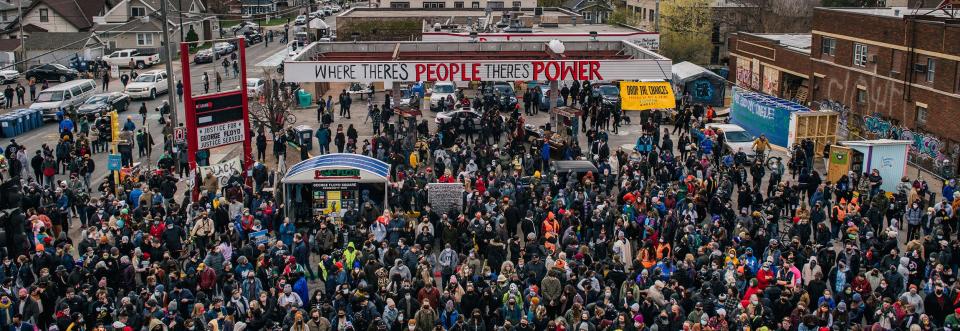
COVID-19 dominates Biden's agenda
Much of the administration efforts early on have focused on addressing the coronavirus pandemic. More than 575,000 people had died of COVID-19 in the United States.
People of color have been disproportionately harmed by the virus, with Black, Latino and Native Americans twice as likely compared with white people to die of it, according to the Centers for Disease Control and Prevention. Advocates say housing discrimination, health disparities and low-paying jobs are among the factors driving high death rates in communities of color.
In January, Biden signed an executive order to set up the COVID-19 Health Equity Task Force. One of its priorities is to better track racial data, which hasn’t been consistently collected by states. The task force hasn’t yet released a plan, but officials say they are targeting resources to hard-hit communities.
“We have tried very hard with imperfect data to be as intentional as we can about reaching those communities that have been underserved,’’ Rice said.
The lack of racial data is part of the broader problem of disparities in wealth, said Richard Besser, president and CEO of the Robert Wood Johnson Foundation and former acting director of the CDC.
“It represents a fundamental lack of attention by public health to issues of equity and that's changing,’’ Besser said.
Besser applauded officials for targeting resources to churches and community centers - places where many people of color turn for services.
“One of the biggest challenges in terms of bringing vaccines to communities at greatest risk is that the institutions that are responsible for doing vaccination are not trusted by everyone in America equally,’’ he said. “They haven't earned the trust.’’
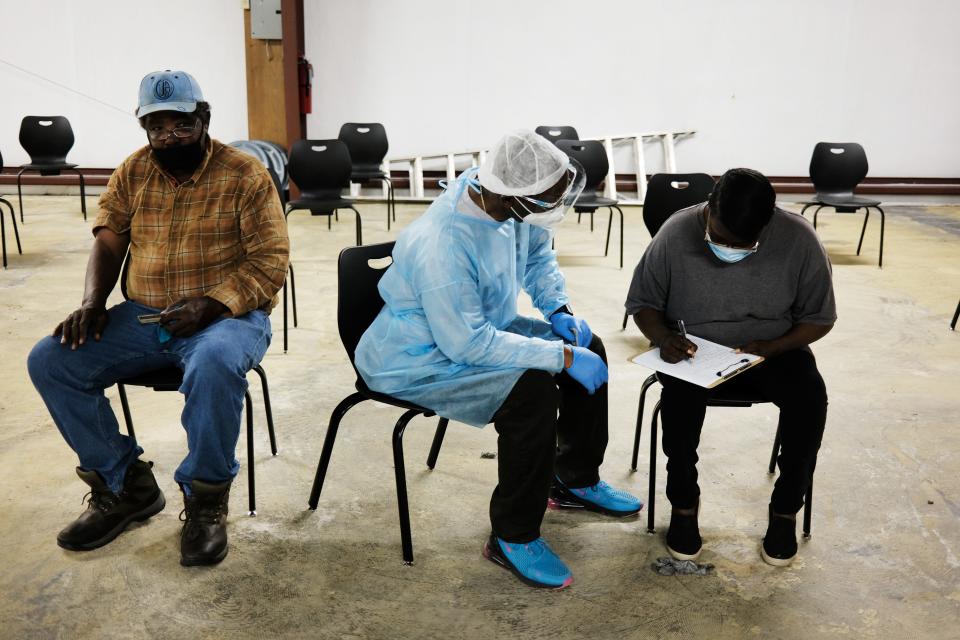
Economic plan could lift people of color
White House officials point to the $1.9 trillion American Rescue Plan as one of the administration’s most significant efforts to address the economic fallout from the pandemic.
Rice said the plan “was intentionally designed so that underserved populations can benefit.”
But Biden is also looking beyond COVID-19 recovery.
Last month, he announced an ambitious plan to cut poverty in half by tackling the systemic barriers that have historically denied Black and brown people access to equal education, housing and health services.
Under the "American Families Plan," the government would spend over a trillion dollars on free community college, federal parental leave and universal day care.
Rice said she’s most proud of the administration’s effort to reduce poverty, particularly child poverty by 50%. The plan would, among other things, expand child tax credits and expand school meal programs.
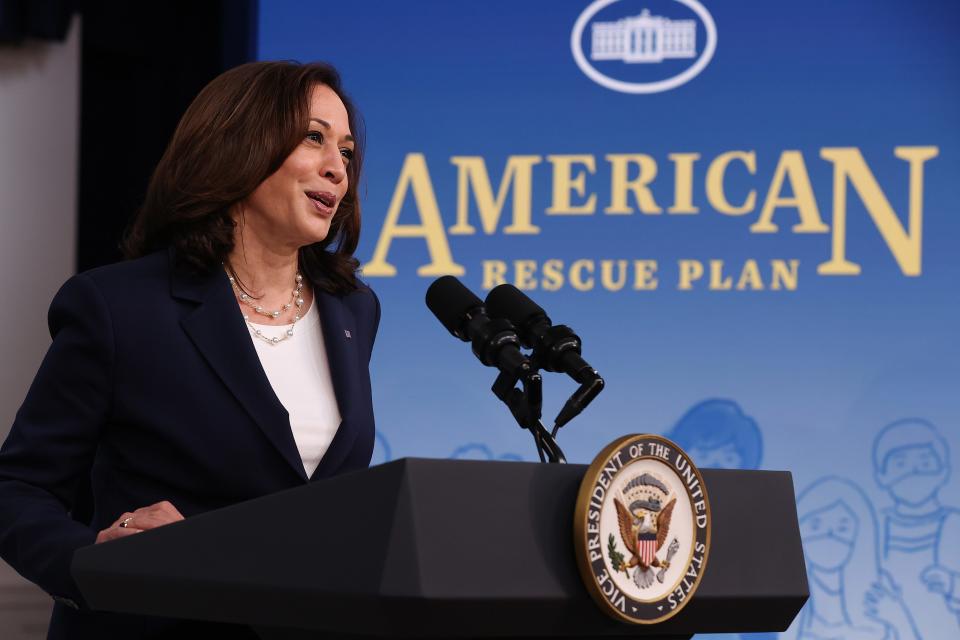
But some social justice advocates said they are disappointed that efforts to increase the minimum wage to $15 have so far been sidelined by Congress.
“For far too long, we’ve tolerated glaring gaps in our economic and health security programs – shortcomings that fall heavily on the shoulders of people of color and those with low incomes,” said Sharon Parrott, president of the Center on Budget and Policy Priorities, a D.C.-based think tank.
More: How U.S. economy has performed during Biden's first 100 days – in 7 charts
Biden, Harris have mixed records on criminal justice reform
The administration has also focused on criminal justice reforms. Earlier this year, Biden signed an executive order phasing out the Justice Department's use of private prisons.
“We've got more to do, and will do, on the criminal justice reform agenda,’’ Rice said.

The Biden administration supports the George Floyd Justice in Policing Act. The Democratic-controlled House passed in March the measure, which aims to bolster police accountability by creating a national registry to track officers with checkered records and banning the use of chokeholds, but its fate is uncertain in the evenly split Senate.
Sen. Cory Booker, a Democrat from New Jersey, said he speaks regularly with Harris and other White House officials about how to get GOP support. Last year, Booker and Harris, then a senator, were co-sponsors of the policing reform legislation.
Biden campaigned on his ability to work with Democrats and Republicans so this issue gives him that opportunity, said Jason Williams, assistant professor of justice studies at Montclair State University in New Jersey.
“He needs to at least show us he can try to do it,” Williams said.
Much of the reforms, including ones setting guidelines for use of force and tracking officers with records of excessive force complaints, will have to happen at the local level, but the federal government has some leverage through grants it awards to states, said Williams.
“It's going to take some time,’’ he said. “It’s good to know that this administration is committed to those issues.’’
Philomena Wankenge, a founder of Freedom Fighters D.C., a social justice group, said Biden and Harris are not doing enough to address police bias during arrests in Black communities. Harris has been criticized for her role as a prosecutor, and Biden for supporting a 1994 law that experts said led to the mass incarceration of people of color.
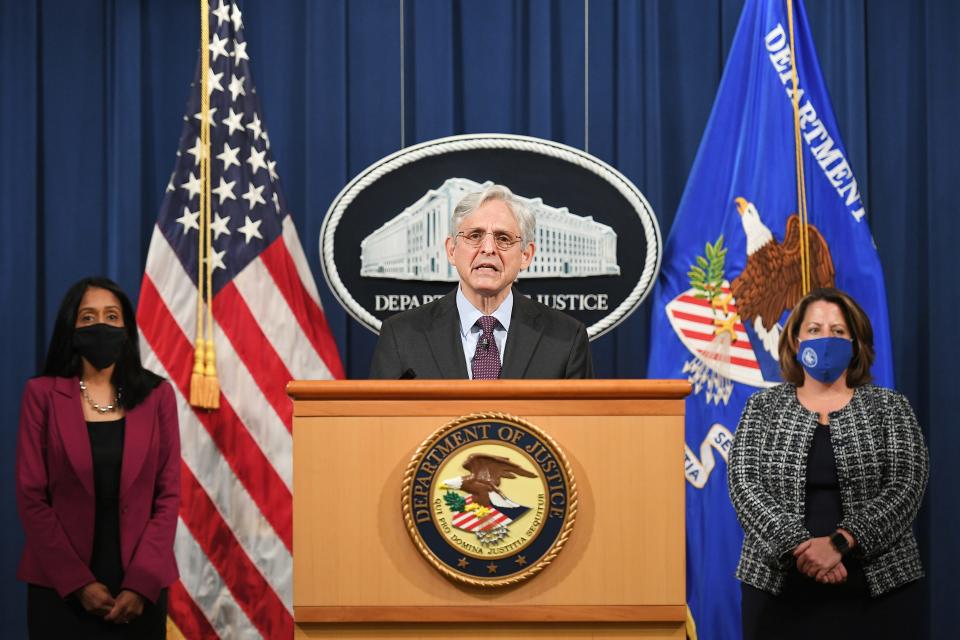
“They’ve rebranded themselves as saviors when they created bills that directly enabled the discriminatory practices police officers partake in now,” Wankenge said.
While Wankenge praised the Biden administration's efforts to address hate crimes against Asian Americans, she questioned why the administration and Congress haven’t done more to push for the passage of an anti-lynching bill. In January, Rep. Bobby Rush, a Democrat from Illinois, reintroduced The Emmett Till Antilynching Act, which would make lynching a federal crime.
“The anti-lynching (bill) has sat on the desk of Congress for years with hardly any progress,’’ Wankenge said.
Biden has championed voting rights
In his first press conference at the White House, Biden blasted efforts in Republican-led state legislatures to pass bills making access to the ballot box more restrictive. He said they aim to turn away voters by reducing hours to vote and requiring more identification.
Last month, Georgia Gov. Brian Kemp signed into law legislation that would overhaul the state’s elections by requiring photo ID to vote absentee and limiting ballot drop box locations, among other changes.
Weeks earlier, Biden signed an executive order directing federal agencies to expand access to voter registration and election information and directing federal agencies to submit a plan to the White House within 200 days on how their departments can promote voter registration and participation.

Biden and other Democrats said Congress must also pass voting rights measures that would expand access and undo some of the states' more restrictive changes, which critics said are aimed at turning away voters of color. The House passed a sweeping bill to expand voting rights last month that faces a battle in the Senate.
In his address to Congress last week, Biden said a record number of people cast ballots last year.
“It should be celebrated,’’ he said. “Instead, it’s being attacked.”
Biden named most diverse Cabinet in history
In addition to Harris, the first African American and South Asian American woman to serve as vice president, Biden supporters point to his picks for top posts in his administration as proof he’s delivered on his pledge to make his leadership team diverse.
His Cabinet includes Lloyd Austin, the first Black secretary of Defense; Deb Haaland, the first Native American to serve as secretary of the Interior; Xavier Becerra, the first Latino to head the Department of Health and Human Services; Alejandro Mayorkas, the first Latino and immigrant to lead the Department of Homeland Security; and Marcia Fudge, the second Black woman to run the Department of Housing and Urban Development.
The administration, however, has been slammed for not nominating an Asian American person to a Cabinet post. Biden nominated Katherine Tai for U.S. Trade Representative, a Cabinet-level appointment. Tai was confirmed last month, making her the first Asian American and first woman of color to serve in that post.
U.S. Rep. Joyce Beatty, chairwoman of the Congressional Black Caucus, also noted that Biden has committed to name a Black woman if there’s an opening on the U.S. Supreme Court.
“I've not heard a president, Black or white, to make a commitment that bold up-front,’’ she said.
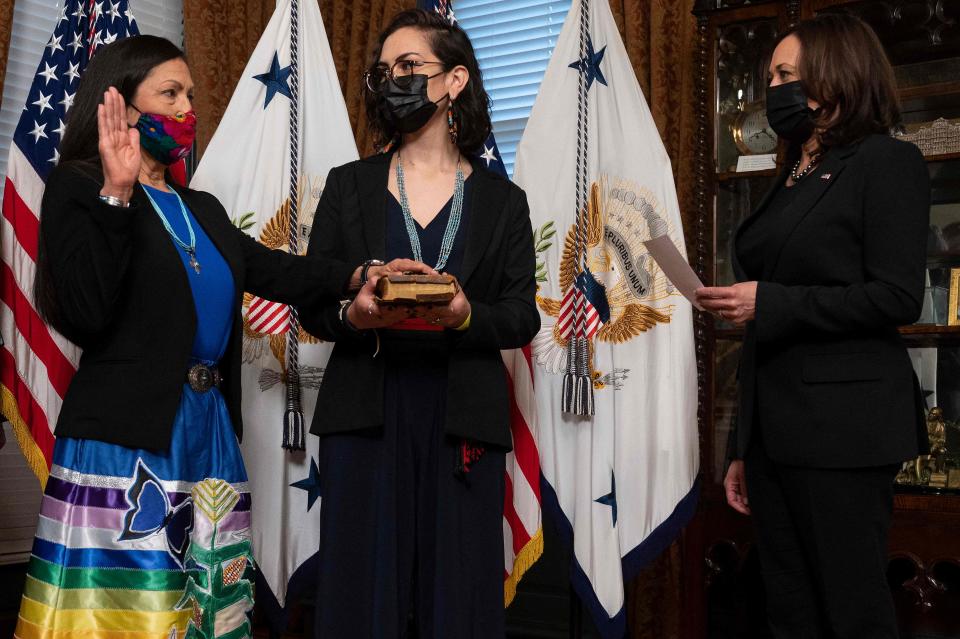
More: Tracking the confirmation of Biden’s Cabinet members
Biden's immigration policy has limited support in Congress
One of the most contentious issues the Biden administration has addressed is immigration, particularly his policy of continuing to house migrant children and families in overcrowded facilities.
Early in his administration, Biden stopped two major Trump administration immigration policies: the construction of a wall along the U.S.-Mexico border, and a program that returned people seeking asylum to Mexico to wait for their immigration proceedings.
In his address to Congress Wednesday, Biden called on lawmakers to pass his comprehensive immigration bill that would create a pathway to citizenship for nearly 11 million people in the United States. The vast majority of these would-be citizens are people of color.

Biden has put Harris in charge of working with Central American countries to try to deal with the root causes of much of the migration to the United States. But some political experts said that’s an unforgiving task.
“That was putting her in a Catch-22,’’ said Williams. “That’s something that the whole administration should have had a hand in and been behind, but the president has to delegate.’’
Experts said immigration reform will require legislative action, which will be challenging in the extremely partisan Congress.
“Considering that the executive itself can’t just like wave a magic wand and change immigration, that has to be a collective process,’’ Williams said.
More: Joe Biden’s immigration agenda overshadowed by migrant challenges in first 100 days
Infrastructure plan aims to provide services and jobs to many people of color
Biden announced a sweeping $2.3 trillion proposal that would rebuild the nation's aging infrastructure, create green jobs, add millions of affordable housing units, expand high-speed internet connectivity and fund day care services.
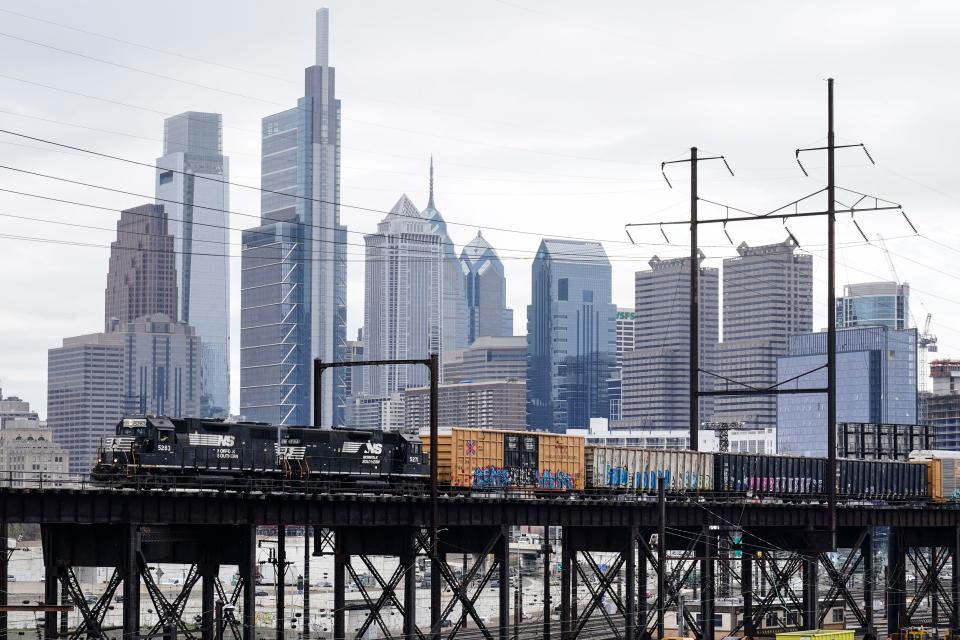
The legislation could help address some of the systemic racial barriers that low-income people of color face in accessing jobs, housing and child care, proponents say.
Republicans slammed the proposal, calling it "Soviet-style infrastructure" and the "wrong prescription for America." The GOP also rejected a key provision that would increase the corporate tax rate from 21% to 28% to pay for the package.
The debate centers on what can and should be defined as infrastructure in the 21st century.
For U.S. Sen. Patty Murray, a Democrat from Washington and chair of the Senate Committee on Health, Education, Labor, and Pensions, infrastructure means the basics Americans need to do their job, such as child care.
"Ask any mom: A road won't do you any good if you can't find safe, affordable child care for your kid," Murray say.
Biden denounced hate crimes against Asian Americans and Pacific Islanders
The president has denounced the uptick in anti-Asian attacks across the country, calling it "wrong and un-American." After a series of shootings in Atlanta left at least eight people dead, a majority of whom were Asian American women, Biden established a task force to address COVID-19-related xenophobia and launched a cross-agency Justice Department initiative to investigate hate crimes.
He also increased federal funding for Asian Americans or Pacific Islanders survivors of domestic violence and sexual assault and called on the expansion of language services across federal agencies.

"We went from President Trump, who referred to the 'Chinese virus,' the 'Kung-flu,' worked to deport our family members and deny services to immigrant families, to a president who announced the official policy of his administration to condemn anti-Asian bias and violence," said California State Assembly member David Chiu, who served as chair of the California Asian Pacific Islander Legislative Caucus.
Biden has defended transgender rights
Amid record levels of fatal transphobic violence, Biden signed a raft of executive orders directed at overturning Trump's anti-LGBTQ policies, including a ban on transgender troops from openly serving in the military. He also directed federal agencies to implement the Supreme Court's landmark decision in Bostock v. Clayton County Georgia, which affirmed that discrimination in employment based on gender and sexual orientation is illegal. In a historic moment for trans equity and health care, Biden tapped Rachel Levine, the first openly transgender federal official, for assistant secretary of health.
Advocates said they want the Biden administration to do more to protect LGBTQ rights, such as housing, jobs, affirmative health care and anti-violence protections at a time when Republican-controlled state legislatures are seeking to limit education rights and health care access for transgender children.
"There's no question, there are major efforts across the country to harm and erase the trans community," said Nicky Zarchen of the Miami Foundation, a major philanthropic institution in South Florida and board member of TransSocial, a Trans-led non-profit working to expand access to services in the state.

Biden inherits historic housing crisis
One of the biggest moves by the Biden administration include several executive orders directing HUD to reverse policies that undermine fair housing practices, as millions of Americans brave the worst housing crisis since the Great Depression.
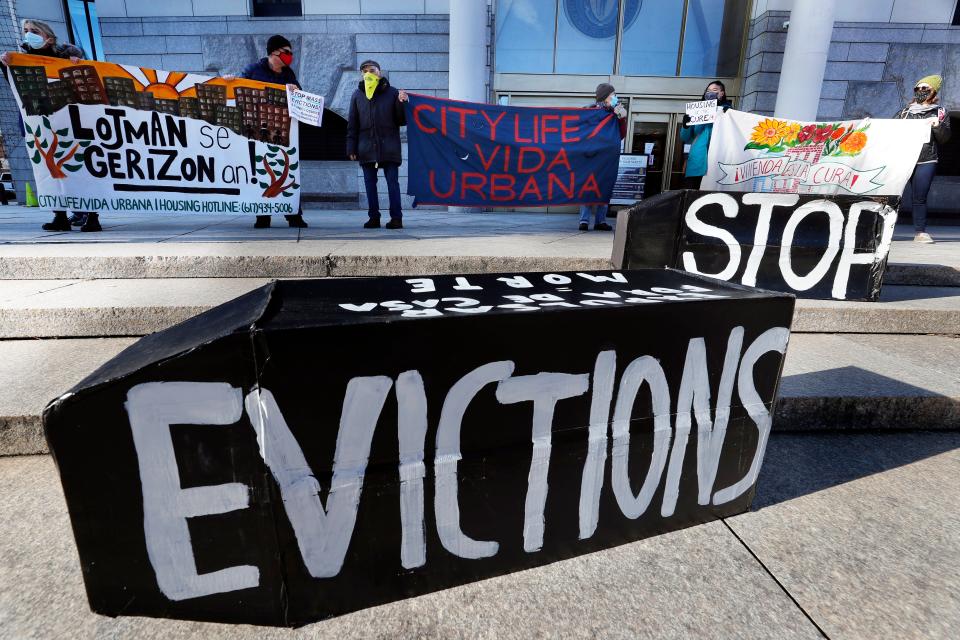
As part of the American Rescue Plan, the administration allocated $21.6 billion for the 40 million households that are under threat of eviction. Fudge, who heads HUD, released $5 billion to help communities create affordable housing and services for people experiencing homelessness. The agency also recently submitted two fair housing rules for review that would require cities to reverse segregation or risk losing federal funds. The other would restore "disparate impact," a decades-old legal standard that outlaws discriminatory lending and renting practices.
"I think he understood that you have to build back in a way that helps people of color," said U.S. Sen. Sherrod Brown, chair of the Senate Committee on Banking, Housing and Urban Affairs.
Brown said that after the administration took steps to stay evictions or foreclosures, the next set of policies would deal with building more transitional housing and long-term housing and combating racism. For the first time ever, the Senate Committee on Banking, Housing and Urban Affairs has held hearings on systemic racism in housing to address Black codes to Jim Crow.
"We are just getting started," Brown said.
Follow USA TODAY national correspondents @dberrygannett and @RominaAdi
This article originally appeared on USA TODAY: Biden 100 days: Black lives matter, anti-hate focus sends message

 Yahoo Movies
Yahoo Movies 
